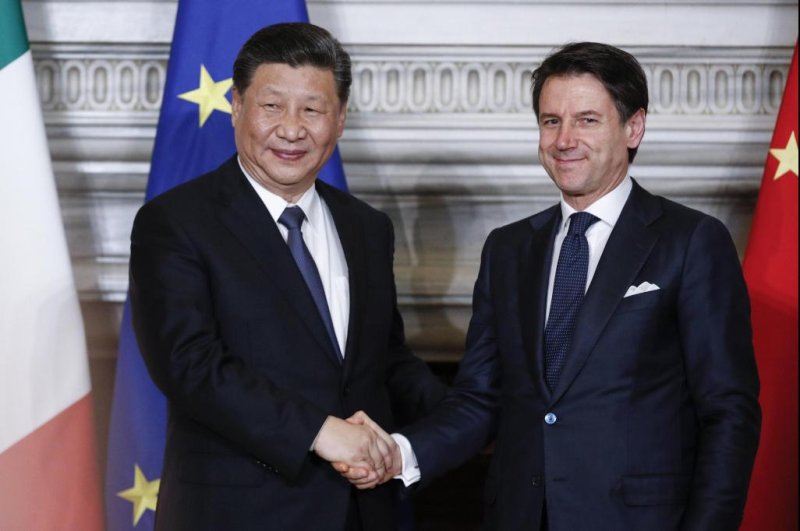Italian premier Giuseppe Conte (R) shakes hands with Chinese President Xi Jinping during their meeting at the Villa Madama in Rome Saturday where Italy signed a memorandum of understanding to make Italy the first Group of Seven leading democracies to join China's ambitious Belt and Road infrastructure project. Photo by Giuseppe Lami/EPA-EFE
March 23 (UPI) -- Italy became the first G-7 country to sign on to China's Belt and Road initiative on Saturday, a deal experts say is meant to expand the country's global ambitions into Europe.
Chinese president Xi Jinping visited Italian government officials in Rome on Friday. Italian Prime Minister Giuseppe Conte said Saturday that his country will build a "more effective relationship" with China in connection with the joining the project, the Washington Post reported.
China's Belt and Road Initiative is a vast multi-continent project of highways, rail lines and energy pipelines connecting China economically to Europe. The Italian deal would open the door for Chinese infrastructure investment in Italian ports, while helping Beijing gain influence and trade goods in Western Europe.
"We export a lot less than we import, compared with our European friends," said Licia Mattioli, vice president for international affairs at Confindustria, the main Italian industry association. "So we think there is a huge potential that we can exploit."
Some European Union leaders cautioned Italy about its bilateral agreement with China.
"We should not be naïve," Dutch Prime Minister Mark Rutte, told reporters Friday about the Chinese-Italian agreement. "You have to take into account the possibility that China, through these policies, is also pursuing its some of its national interests. It can present a problem given the content of those agreements."
Some experts expressed concern because Italy did not discuss geopolitical concerns about the Chinese project with the EU and United States allies.
"Everyone is somehow involved in the project but no other G7 country has signed an MoU of this kind," Renzo Cavalieri, a professor of law of east Asian countries at Ca' Foscari University of Venice, told the Guardian.
"What Italy has done, in quite a disordered way, is take a step ahead to create something which, so far, is not that strong in content but is quite important symbolically," he added.















